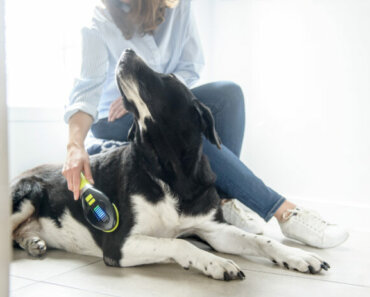Spring allergies are a frustrating part of life for a lot of humans, but unfortunately dogs experience the discomfort of seasonal allergies as well. Just like people, dogs can have allergic reactions to pollen, dust, grass, mold as well as various foods and especially flea bites.
These are the seasonal allergy symptoms to look for
Allergies are uncomfortable and dogs experiencing seasonal allergies may display a variety of symptoms. Dr. Shelia Gomez, who specializes in Dermatology at NorthStar Vets Veterinary Emergency Trauma & Specialty Center explains that common canine allergy symptoms tend to center on the dog’s skin and include:
- Itching and/or licking at skin.
- Erythema (redness) of the skin.
- Hair loss and thickening of the skin.
Dr. Gomez notes that when experiencing seasonal allergies, dogs may rub their face and eyes or have concurrent ear infections. Although less common, some dogs with seasonal allergies might experience occasional hot spots or only ear infections. Dr. Gomez explains that most frequently she sees allergic responses to fleas, though because of the number of treatments to prevent fleas those are becoming less common. Dogs can also experience allergic reactions to certain types of food, as well as environmental allergies to grasses, dust mites, pollen and more.
Related: Hot Spots on Dogs — Causes, Treatment and Prevention
Are certain breeds more at risk for seasonal allergies?
Any breed of dog or mix of breeds can experience allergies. “It is important to remember that any dog can have an allergy, be they mixed breeds such as Doodles or Pit Bull crosses, or purebred dogs,” says Dr. Gomez, adding that allergies in dogs are believed to be hereditary. As a result, Dr. Gomez says some breeds are more prone to allergies.
These breeds include:
Labrador Retrievers, Golden Retrievers, Cocker Spaniels, Cavalier King Charles Spaniels, Springer Spaniels, Shih Tzus, Lhasa Apsos, Newfoundlands, Cairns, West Highland White Terriers, Yorkshire Terriers, Jack Russels, Parson Terriers, Wheaten Terriers, all sizes of Poodles and crosses, German Shepherd Dogs, American and Staffordshire Bulldogs, Pit Bull Terriers, Mastiffs and BullMastiffs, Shar Peis and Shetland Sheepdogs.
Although these dog breeds may be prone to allergies, allergies can and are experienced by dogs of any breed or mix of breeds.

Photo: Finn | Getty Image
What to do if you think your dog has seasonal allergies
If you think that your dog might be experiencing seasonal allergies Dr. Gomez advises developing a diagnostic plan with your veterinarian or veterinary dermatology specialist before starting to change foods or your dog’s environment “this will hopefully save them time and money in the long run, as an allergy workup should be done in a systematic and tailored way based on the needs and history of the individual dog.” Dr. Gomez says.
Testing for seasonal allergies will allow your vet to “try and identify the allergens that are contributing to the clinical signs the dog is experiencing.” Testing for allergies in dogs involves either a blood test, intradermal skin testing, or both. For a variety of reasons pursuing allergy testing isn’t an option for every dog owner. In these cases, Dr. Gomez explains cases it is possible for vets to work on treating some of the symptoms without identifying specifically what is causing the allergy. The goal is to make the dog as comfortable and symptom-free as possible.
Treating your dog’s allergies also means treating any other skin conditions which may have developed due to your dog’s itching and scratching. “It is imperative to remember that any secondary infection in the skin, such as bacterial, fungal, or parasitic, will need to be cleared or controlled for good long-term control of allergies” advises Dr. Gomez.
Related: What to do if Your Dog Needs Vet Care During the Coronavirus Pandemic
Should you use over-the-counter medication to treat your dog’s seasonal allergies?
Many dog owners are tempted to try over-the-counter antihistamine medication if they suspect that their dog has allergies, such as Benedryl, Zyrtec or ClaritinBut according to Dr. Gomez d “Studies that have been done looking at some of these medications have found little evidence of their efficacy in dogs.” If you want to try an over-the-counter medication to treat your dog’s allergies, first you must speak with your dog’s veterinarian first to see if the drug will cause more harm than good. These medications were created for humans, not for dogs, and some human medications are quite harmful to dogs.
How to develop a seasonal allergy treatment plan
Battling your dog’s allergies will take time and dedication.
“Having a good veterinarian or veterinary dermatologist to help guide the process and have a plan for the pets is important, and equally important is having owners that are willing, able and diligent in pursuing therapies that will work, and continuing them to keep their dog as comfortable as possible,” says Dr. Gomez.
Unfortunately, like with people allergies can be difficult to control for some dogs and not every treatment will work for every dog. This means that you and your veterinarian may have to try multiple allergy treatments in order to find one that is successful with reducing your dog’s allergy symptoms.
Top photograph: alexei_tm/Getty Images


























